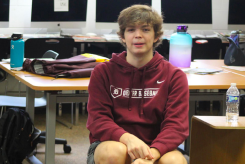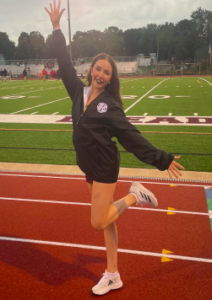More than 40% of DHS students have ‘no clue’ what their future holds
By: Aspen Taylor
In a survey of 300 Dexter High School students, 41% of students answered that they have no clue what their career plans are. Since high school is seen as a way to prepare students for the future, 41%, to some, is a pretty ominous number.
Most students have trouble finding a career that involves their interests. If this is you, and you’re feeling stumped, some students say a way to find your passion is to invest time in all your interests and hobbies, no matter how small.
A representation of this is Conor Sweeny, a DHS senior. Sweeny is planning to minor in psychology in college, not because of intense classes he took, or courses he was placed in, but instead because of an interest that started near the beginning of his high school career.
Around that time, Sweeny had begun to notice and take an interest in the little things that people would do or say.
“I really just started to get more interested in when someone would do something, and I’d just kinda be like, ‘why? Why would they do that?’” Sweeny said.
An education in psychology is supposed to help a person be able to better understand and make sense of the world, and, in Sweeny’s case, the people around them.
“You kinda try to make sense of it in your head, or that’s what I try to do in my head, so I think it would be interesting to explore deeper answers for that,” Sweeny said.

Another way to locate potential passions, according to students, is to take different classes that are of interest. For example, sophomore Ainslie Ramsburgh became interested in sports medicine after being placed in athletic health classes in school and experiencing physical therapy visits frequently as a competitive athlete.
Over that time she realized that she was actually quite interested in the profession, and has taken more similar classes since, such as IB sports medicine.
To really invest in her goal, Ramsburgh even started her own club dedicated to sports medicine, and is still continuing to follow this potential profession today.
“I kinda just knew what my interests were in life, and the way I wanted to make sure working didn’t feel like a job,” Ramsburgh stated.

High school, though, doesn’t have to be the place where you make your final decision; If students do have an idea about their career plan, it makes sense to see where it takes them, but a teacher said students should never tether themselves to one idea.
Journalism teacher Christopher Mackinder made many career jumps before becoming a teacher. He decided during summer between his sophomore and junior year of high school that he wanted to be a sports reporter. After taking multiple journalism classes in high school, he attended Michigan State where he worked full-time as a sports reporter while majoring in journalism. Over time, however, he made the career shift into teaching journalism and English.
Another story is that of Dan Taylor. Out of high school and into college, Taylor started his own business. He then attempted to join the police force before later switching to the US Marine Corps. In the end, Taylor used his college degree in finance to secure a financial manager position.
All in all, both students, teachers, and other professionals suggest finding what drives you is important. Most importantly, if students don’t know what the future holds quite yet, there isn’t a need to worry. After all, they do have the rest of their life to do that.
